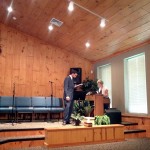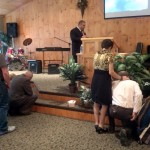The Missional Church
 The nature of the church is missional, through the fact that its existence is powered by the Great Commission. The book summarizes the culture of today’s American spirituality and its relation to the apostolic church. The main question is, “What would a theology of the church look like that took seriously the fact that North America is now itself a mission field?”
The nature of the church is missional, through the fact that its existence is powered by the Great Commission. The book summarizes the culture of today’s American spirituality and its relation to the apostolic church. The main question is, “What would a theology of the church look like that took seriously the fact that North America is now itself a mission field?”
Five Key Insights
1. The missional nature of the church – The place which the church takes in the surrounding world/society defines its nature as missional. How it interacts with the surrounding worlds identifies the church’s response to the needs of individuals and groups of people and results in its success/failure to fulfill its original mission. A valid point was the statement that the witness of the missional church is characterized by its integrity.
2. Recovering missional identity – Recovering the church’s original New Testament identity has been a subject of discussion for many various ages in church history. The volume of works written about it has indeed increased in the latter part of the 20th century. The discussion in the book claims that as truth, self, and society are rediscovered in postmodernism, the churches of North America will recover its missional identity. Thus, the individual search of identity will reflect on the corporate search of the church as a community and as the Body of Christ. Chapter four further claims that the churches missional identity is shaped by the gospel of the reign of God which Jesus preached.
3. The Holy Spirit and the community of the missional churches – The Chapter on the Holy Spirit, although very informative, did not integrate the connection between the Spirit and Missional outreach to a practical paradigm, but it was mostly a theoretic and philosophical proposition.
4. On spiritual leadership – the discussion on spiritual leadership is based on the axiom that leadership is focused on the reign of God. Only then the church assumes its mission. Solving problems and creating unity within the church is reached through the same focus on the reign of God.
5. The secular surroundings – the vision of the church may not align with the secular surrounds. Actually, it may often completely contradict them fulfilling its role as a prophetic utterance. At the same time, social, political and economical factors may oppose the message and the mission of the church, thus creating an atmosphere in which the church grows against the grain.
Leading and Managing a Growing Church
According to George Hunt the three main roles of each pastor of an effective and growing church are:
- Leader communicating the church vision, purpose, and direction
- Manager utilizing people and resources, assigning specific roles, jobs, and tasks, in order to achieve the mission’s purpose.
- Administrator facilitating the flow of the organization and makes sure it is efficient. (p. 26).
The following paper is a basic list of my actions in my present context of ministry grouped according to the above categories.
Leadership
- Creating, providing and consciously supporting a spiritual environment of prayer for leadership decision-making.
- Vision: Receiving the vision for the department and communicating a vision through all existing structures to all people in the department without any exception.
- Purpose: presenting a purpose of the vision – what would be the results of fulfilling the vision.
- Mission: how does the vision compliment the overall mission of the congregation?
- Relationships: relating to people s needs, spiritual growth and transformation.
- Message: in the church context providing a message related to the vision empowering the gifts of the people, encouraging with a hope for the future and at the same time ministering to their present situation personally, in their families as a basic church structure, and in the corporate presence of the church congregation as a community.
- Interacting with existing systems, structures and hierarchy in the church through providing an adequate leadership model in the assignment department.
Management
- Creating, providing and consciously supporting a spiritual environment of prayer for management decision-making.
- Creating an environment for adequate and timely problem solving in relationship to relationships between people and resources or both.
- Forming and continuously developing a dynamical financial strategy in accordance with the overall financial strategy of the congregation that provides for the ministry needs.
- Budget planning as a part of the annual church budget presented by the senior pastor and approved by the pastoral/church council.
- Creating relationships with long and short term sponsors.
- Providing and implementing long and short term fundraiser strategies.
- Finding, creating and building resources providing and adequate model for their purposeful usage.
- Creating annual and/or five-year projections for the further development of the ministry department in accordance with the available resources and the adequately provided leadership plans.
Administration
- Creating, providing and consciously supporting a spiritual environment of prayer for administration decision-making.
- Establishing communication with leaders and members through a variety of mail outs, websites, weekly bulletins, monthly newsletters and presentations.
- Cataloging member profiles in an information database to create a holistic church communication structure, and available for planning an extended church strategy.
- Forming basic structures and systems to aid the youth ministry:
- Volunteer leaders
- Student leaders
- Small groups
- Small group leaders
- Weekly meetings
- Wednesday night leaders
- Sunday school teen program, etc.
- Providing training, feedback and communication with the department structures aiming better results and relationships.
- Participating in church boards, interacting with directors, establishing and executing the proper chain of command.
- Creating and publishing reports and statistics inclusive of results.
- Analyzing the available data, structuring the results with proper feedback and providing a strategic plan for further development of the ministry.
The Once and the Future Church
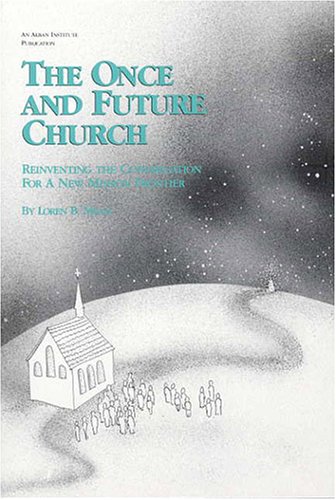 “The Once and the Future Church” is a discussion of the paradigm shift occurring in the church today. The thesis deals with the lost paradigm of the apostolic church and the process of rediscovering the lost paradigm in the present/future church. The result is renovation of the church and its mission.
“The Once and the Future Church” is a discussion of the paradigm shift occurring in the church today. The thesis deals with the lost paradigm of the apostolic church and the process of rediscovering the lost paradigm in the present/future church. The result is renovation of the church and its mission.
Mead presents the main problem of the present church with its leaders who have grown under a paradigm that has ceased to work. The continuous living in different paradigms have created in the church a painful polarization between the old and the new and this has been a conflict, which the majority has preferred to avoid.
The four groups, which are subject of the present challenge of dislocation, are the clergy, the laity, the bishop and the congregation. The clergy have created alternative for genuine ministry called clericalism. The laity has separated itself from the experience of church. The bishop is struggling with the battle between the above two. The congregation is left with the painful experience of continuous dislocation.
In his forecast for the future development of this process, Mead calls for steadiness and perseverance through uncertainty, and thus reinventing the church. This process will confront parish with congregation, servanthood versus conversion, exclusivity and inclusiveness. The new church demands a new theology localized away from the academy to the new missionary frontier. Building the future church requires a better sense of community. And finally, the renovation process within the community of believers is an intergenerational mission. In this sense, the rediscovery of the church continues from generation to generation thus transmitting those forms of community discovered by the present church to the future one.
Mission Bulgaria 2005-2012 Completed
 We are currently finalizing our Mission Bulgaria project through a seven-year long commitment, which has touched the lives and ministries of over 250 local churches in the country of Bulgaria. Along with these congregations, our international ministry team has worked with the Bulgarian Diaspora churches in the United Kingdom, Cyprus, Spain, Germany and France. Six Bulgarian churches are currently operating in Cyprus and four in the U.K., as there are projections for the registration of other Bulgarian churches as well. It has been a journey worth taking.
We are currently finalizing our Mission Bulgaria project through a seven-year long commitment, which has touched the lives and ministries of over 250 local churches in the country of Bulgaria. Along with these congregations, our international ministry team has worked with the Bulgarian Diaspora churches in the United Kingdom, Cyprus, Spain, Germany and France. Six Bulgarian churches are currently operating in Cyprus and four in the U.K., as there are projections for the registration of other Bulgarian churches as well. It has been a journey worth taking.
In relation to our ministry work in Bulgaria in the period of 2005-2012, among many others we’ve completed these seven milestones:
1. The publication of a complete revision of the Bulgarian Bible
2. Completing a new literal translation of the Bulgarian New Testament from the original Greek including the four gospels, acts, epistles, and the apocalypse
3. Establishment of the Bulgarian Chaplaincy Association with the special recognition of the US Department of State
4. Foundation of the Masters of Chaplaincy Ministry Program for Eastern Europe
5. Our national X event for youth every summer since 2005, which is accompanied with a Bible Camp for young ministers and a national mobile educational strategy
6. Building a broadcasting network which supports LIVE streaming of services and events for over 20 Bulgarian congregations every week
7. Implemented a long-term church planting proposal for establishing Bulgarian ethnic congregations outside of Bulgaria
After completing 7 years of ministry in Bulgaria, we are publishing a detailed overview of our work and results in a soon to be published monograph called simply Confessions. This new book speaks of the lessons we’ve learned in the ministry and issues of church and politics within the religious life of the country we’ve struggled to resolve. It addresses:
- The separation of church and politics of false religiosity
- Entering an organic relationship with God
- Depending fully in the ministry of the Holy Spirit
- Renvisioning the reality of the Kingdom
- Raising a new Pentecostal generation
- Reliving His glory
- Leaving a legacy worth remembering
As we are celebrating our 7-year long accomplishment of Mission Bulgaria, we are reminded that in 2013 God is doing a new thing.
5 Marks of a Missional Church
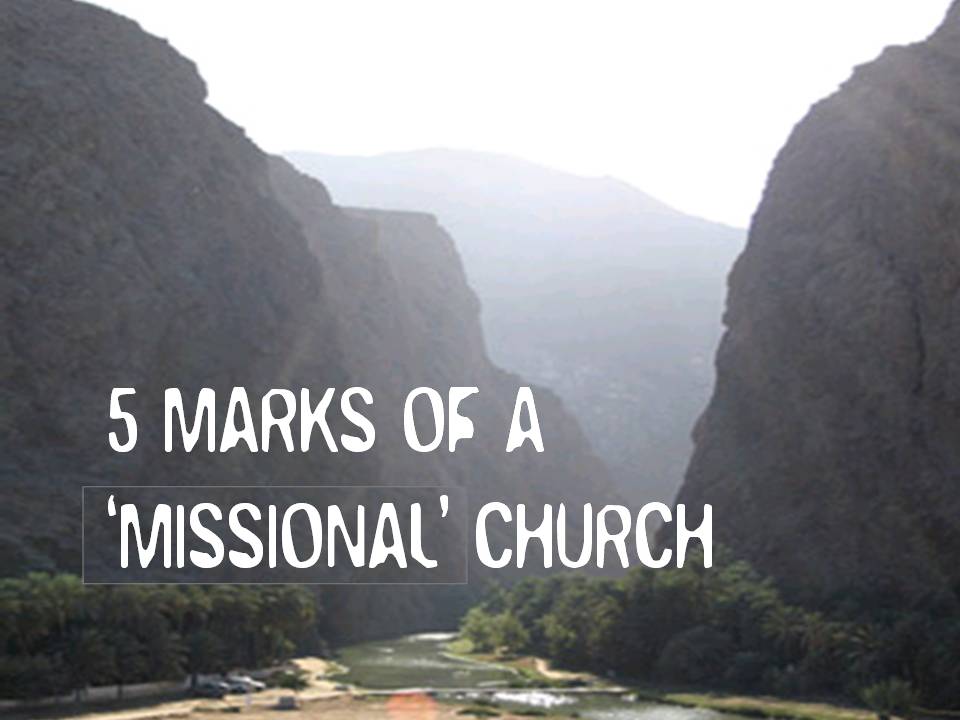 1. When we reach out without selling out.
1. When we reach out without selling out.
2. When every part of the church’s life is hospitable to people who do not yet grasp the Gospel.
3. When we move away from a ‘tribal’ atmosphere to a ‘missional’ atmosphere.
4. When we respect and talk to people like we do at work.
(Find common ground to build friendships)
5. When we understand more and more how the Gospel changes everything.
The Gospel Changes Everything
The Gospel changes people from the inside out. Christ gives us a radically new identity, freeing us from both self-righteousness and self-condemnation. He liberates us to accept people we once excluded, and to break the bondage of things (even good things) that once drove us. In particular, the gospel makes us welcoming and respectful toward those who do not share our beliefs. We can deeply love people who reject or are indifferent to Gospel because we understand that it was the goodness of God that led us to repentance.
Bible Studies on the Church of God Declaration of Faith
 This small book has been over ten years in the making. It is a commentary and study guide for the doctrinal teachings of the Church of God aligned with our Declaration of Faith. It was initially prepared for Bible School and seminary students due to the lack of Sunday school and teaching literature in the Bulgarian vernacular. Through the years however, it has became the standard teaching tool in Sunday schools and programs across the country being used in several Bulgarian churches across Europe as well.
This small book has been over ten years in the making. It is a commentary and study guide for the doctrinal teachings of the Church of God aligned with our Declaration of Faith. It was initially prepared for Bible School and seminary students due to the lack of Sunday school and teaching literature in the Bulgarian vernacular. Through the years however, it has became the standard teaching tool in Sunday schools and programs across the country being used in several Bulgarian churches across Europe as well.
The Bible series was initially published in single lesson leaflets for the Church of God in Sofia. Our team would prepare the lessons every week and print about a thousand copies of each to teach at the beginning of each Sunday morning service. As we gathered information from the local churches at the 2002 Church of God national minister’s meeting, it was reported that thousands of leaflets were being copied, distributed and taught each month without us even knowing about it. Our team has further presented the complete series in the Church of God congregations of Sofia, Pravetz, Ruse, Gabrovo and even Chicago. We are grateful that after all these years it has finally seen its publication as a book accompanied with the video teachings of our weekly Bible Hour broadcast program.
Lessons accompanied with video presentations included in volume 1:
Lesson 1: My Bible
Lesson 2: Holy Trinity
Lesson 3: Jesus Christ
Lesson 4: Repentance for Salvation
Lesson 5: Difficult Questions
Lesson 6: Fasting
Lesson 7: Prayer
Lesson 8: Holiness
Lesson 9: Holy Ghost Baptism
Lesson 10: Giving and Charity
Lesson 11: Water Baptism
Lesson 12: Divine Healing
Lesson 12: Divine Healing
Lesson 13: Holy Communion
Lesson 14: Last Days
Lesson 15: Resurrections
Lesson 16: Fruit and Gifts of the Spirit
Lesson 17: Theology with Melody
Lesson 18: Ministry and Praxis
Lesson 19: Angels
Lesson 20: Pentecostal Primitivism
Selling out the Church
 “Selling out the Church” is a protest against the market-driven shape which society has given to the modern church. The authors defend the thesis that the form in which the gospel is manifested molds the content of its message. The main focus is on the aggressive use of marketing principles to advance the vision of the church without taking into consideration all negative effects that may follow because of it.
“Selling out the Church” is a protest against the market-driven shape which society has given to the modern church. The authors defend the thesis that the form in which the gospel is manifested molds the content of its message. The main focus is on the aggressive use of marketing principles to advance the vision of the church without taking into consideration all negative effects that may follow because of it.
They contend the church marketing principles articulated by Kotler claiming that the purpose of the church is to be a sign of the future Kingdom and the new creation which God is bringing into being. The marketing principles actively oppose this purpose of the Christian church as they emphasize on making the church more attractive to the eventual “customers.”
These strategies wrongly accent on attracting people to the Christian community through offering them to meet their apparent needs and thus give them proper reasons for being churchgoers. This way the target of the church becomes the consumer as the church is expected to provide the proper products. The problem is that the Christian faith does not follow “the logic of self interested exchanges.”
The main problem is that when the church acts as just another manufacturer of hopes, it is no longer able to act as directed by God. The actual truth is that the world no longer expects the church to act according to its calling but rather according the present market needs. Meeting the worlds expectation means the church mission is redefined to whether or not a “customer” would keep his/her business with the church.
The importance of the book is its presentation of how any cultural formation introduced into the church, can deform its message and form a corrupted vision, which will reflect negatively on its future development.
Bulgaria’s Orthodox Church Elects New Patriarch
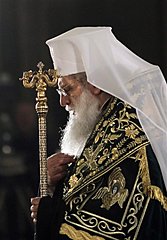 Metropolitan Neofit of Ruse was elected Sunday as the new spiritual leader of Bulgaria’s Orthodox Christians amid social unrest threatening to throw the Balkan country in a serious political crisis. The 67-year-old Neofit was picked among three candidates shortlisted in a secret ballot by the 14 bishops that make up the Holy Synod of the church.
Metropolitan Neofit of Ruse was elected Sunday as the new spiritual leader of Bulgaria’s Orthodox Christians amid social unrest threatening to throw the Balkan country in a serious political crisis. The 67-year-old Neofit was picked among three candidates shortlisted in a secret ballot by the 14 bishops that make up the Holy Synod of the church.
The enthronement ceremony for Patriarch Neofit was held at Sofia with ongoing nationwide protests against high energy bills, poverty and corruption, and demands for radical political reforms, which forced the government to resign. Speaking at the ceremony, President Rosen Plevneliev voiced hope the new patriarch will contribute to Orthodox unity and the strengthening of the faith, and will preserve the integrity of the church.
The main challenges Neofit will face at home are addressing church unity, the church’s isolation from current public concerns, financial troubles and the dwindling number of priests and monks. Last year, a panel investigating communist-era secret services announced that 11 of the 15 metropolitans had ties to those services. Among those named was also Neofit. Over 20 Pentecostal and charismatic denominational leaders were also revealed to have been a part of a nationwide network of secret agents and handlers organized by the communist secret police. Yet, only two have resigned form their leadership positions. Alike many evangelical leaders in Bulgaria, the patriarch of the Orthodox church is elected for life.
Patriarch Maxim, Eastern Orthodox Church Leader of Bulgaria, Dies at 98
 SOFIA, Bulgaria (AP) — Patriarch Maxim of Bulgaria, who weathered a revolt over his Communist-era ties to lead his country’s Orthodox Christians for more than 40 years, died here on Tuesday. He was 98. Patriarch Maxim’s tenure as the church’s leader bridged Bulgaria’s transition from Communism.
SOFIA, Bulgaria (AP) — Patriarch Maxim of Bulgaria, who weathered a revolt over his Communist-era ties to lead his country’s Orthodox Christians for more than 40 years, died here on Tuesday. He was 98. Patriarch Maxim’s tenure as the church’s leader bridged Bulgaria’s transition from Communism.
Orthodox Christianity is Bulgaria’s dominant religion, followed by more than 80 percent of the country’s 7.4 million people. Patriarch Maxim’s tenure as the church’s leader bridged the country’s transition from Communism, and he withstood efforts to oust him by the new democratic government and by rebel priests who saw him as a Communist ally. Born Marin Naidenov Minkov on Oct. 29, 1914, he graduated from the Sofia Seminary in 1935 and entered Sofia University’s theology department in 1938, before rising through the church ranks to be named patriarch on July 4, 1971.
After the collapse of Communism in 1989, Bulgaria’s new democratic government sought to replace Communist-appointed figureheads, including the patriarch. The church split between supporters of Patriarch Maxim and breakaway clergymen, who tried to oust him and then formed their own synod. The division plunged the church into turmoil, with church buildings being occupied, priests breaking into fistfights on church steps, and water cannons and tear gas being turned on rebel bishops to clear the main St. Alexander Nevsky cathedral in Sofia. For more than a decade the two synods existed side by side. The schism ended in 2010, when the head of the alternative synod called for healing and the synod was dissolved.
Patriarch Maxim was hailed for meeting with Pope John Paul II during the pontiff’s visit to Sofia in 2002, a trip seen as warming the frosty relationship between the Orthodox Church and the Vatican. The Holy Synod of 13 senior clergy members will choose an interim patriarch until a larger Church Council is held within four months to pick Patriarch Maxim’s successor, church officials said.



